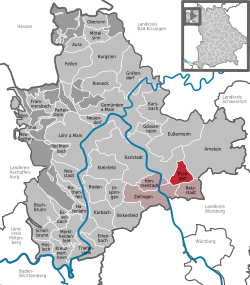Thüngen
| Thüngen | ||
|---|---|---|
|
||
| Coordinates: 49°56′32″N 9°51′34″E / 49.94222°N 9.85944°ECoordinates: 49°56′32″N 9°51′34″E / 49.94222°N 9.85944°E | ||
| Country | Germany | |
| State | Bavaria | |
| Admin. region | Unterfranken | |
| District | Main-Spessart | |
| Municipal assoc. | Zellingen | |
| Government | ||
| • Mayor | Klaus Enzmann (Bürger) | |
| Area | ||
| • Total | 13.61 km2 (5.25 sq mi) | |
| Elevation | 199 m (653 ft) | |
| Population (2015-12-31) | ||
| • Total | 1,332 | |
| • Density | 98/km2 (250/sq mi) | |
| Time zone | CET/CEST (UTC+1/+2) | |
| Postal codes | 97289 | |
| Dialling codes | 09360 | |
| Vehicle registration | MSP | |
| Website | www.markt-thuengen.de | |
Thüngen is a market community in the Main-Spessart district in the Regierungsbezirk of Lower Franconia (Unterfranken) in Bavaria, Germany and a member of the Verwaltungsgemeinschaft (Administrative Community) of Zellingen.
Thüngen lies in the Würzburg Region, 25 km north of Würzburg and 30 km west of Schweinfurt, in the north of the Main Triangle (Maindreieck) on the river Wern.
The community has only the Gemarkung (traditional rural cadastral area) of Thüngen.
On 19 April 788, Thüngen had its first documentary mention. In the Codex Eberhardi, it says:
... Manto comes et frater eius Megingoz tradiderunt sancto Bonifacio bona sua in his locis: Isinhusen, Wanchei, Heselere, Tungede, Binizfelt, Hoholtesheim, Steti, Bucheled ...
The placename Thüngen comes from the word Thing (also seen in Old English þing in the same sense, namely “assembly”). A þing (pronounced the same way as the Modern English thing) or a Ding (Modern High German) was the name for Volksversammlungen (roughly, “folkmoots”) and assizes held under old Germanic law. Thüngen’s origins therefore point to a place where such gatherings were held. This explanation for the community’s name’s origin is disputed, however, with alternate explanations positing a Celtic or Roman source for older forms of the name such as Thungidi or Tungede.
Until about 1200, the community’s lords were the Counts of Henneberg. After they died out, the lordship was taken over by a knightly noble family who later named themselves “von Thüngen” after the place. Thüngen’s history is tightly bound with this noble family.
...
Wikipedia



